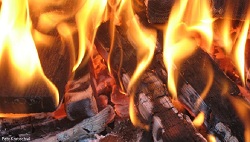Wood Fuelled Heating
Wood fuelled heating systems generally burn wood pellets, chips or logs to power central heating and hot water boilers or to provide warmth in a single room. Take a look at the ways wood can be used to heat your home.
How do wood fuelled heating systems work?
There are two main ways of using wood to heat you home:
- A standalone stove burning logs or pellets to heat a single room. Some can also be fitted with a back boiler to provide water heating as well.
- A boiler burning pellets, logs or chips connected to a central heating and hot water system.
Log burning stoves and boilers have to be filled with wood by hand. Some pellet and chip burners use automatic fuel feeders which refill them at regular intervals from fuel storage units called hoppers.
The benefits of wood fuel heating:
- A low carbon option: the carbon dioxide emitted when wood fuel is burned is the same amount that was absorbed over the previous months and years as the plant was growing. As long as new plants continue to grow in place of those used for fuel, the process is sustainable. There are some carbon emissions caused by the cultivation, manufacture and transportation of the fuel, but as long as the fuel is sourced locally, these are much lower than the emissions from fossil fuels.
- A good use for waste wood: burning wood can be a convenient means of disposing of waste that might otherwise be sent to a landfill site.
Is a wood fuelled heating system suitable for my home?
To tell if wood fuelled heating is right for you, there are a few key questions to consider:
- Do you have enough space? You'll need a large dry area close to the boiler to store your wood. Ideally this should be close to where the wood is delivered to your home to minimise the distance you have to carry it.
- Do you have a suitable flue? You need a vent which is specifically designed for wood fuel appliances, with sufficient air movement for proper operation of the stove. Your existing chimney can be fitted with a lined flue, which is relatively inexpensive.
- Can you comply with safety and building regulations? If you live in an old or unusual home this may be an issue. For more information, see Part L of the Building Regulations, Northern Ireland and Section 3 of the Technical Handbooks, Scotland
- Do you live in a smokeless zone? If so then wood can only be burnt in certain exempted appliances. https://www.uksmokecontrolareas.co.uk/locations.php
- Do you need planning permission? You need to talk to your local authority if your flue will extend 1m or more above the height of your roof, or your home is in a Conservation Area or World Heritage Site and you plan to install a flue on the principal elevation visible from a road.
Cost and savings:
Costs for a standalone stove are around £5,800 including installation. A typical automatically fed boiler for an average home costs around £11,500 including installation and installing a suitable flue, and VAT at 5%. Manually fed log systems are slightly cheaper.
Savings in CO2 emissions are significant - up to 9.5 tonnes per year when a wood boiler replaces a solid (coal) fired system or electric storage heating.
Fuel savings are less significant, and if you replace a gas heating system with a wood burning system you may end up paying more for your fuel. But if you replace solid fuel or electric heating you could save between £170 and £390 per year.
Wood costs often depend on the distance from your home to a wood supplier and whether you can buy and store wood in large quantities. If you have your own supply of wood fuel then this can significantly reduce your costs. Typically, heating and hot water costs for a year will be around £1,000 in a detached property.
For a list of wood fuel suppliers in your area, visit the log pile website
To find renewable technologies to suit your home contact your local Energy Saving Trust advice centre free on 0800 512 012
Or visit www.energysavingtrust.org.uk